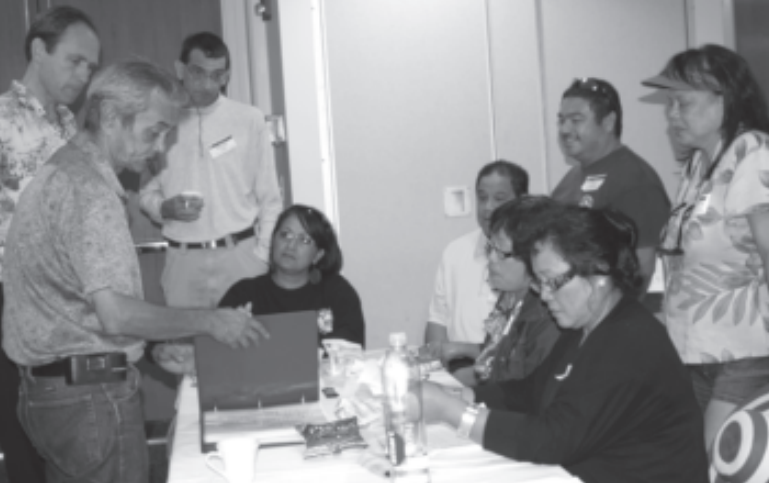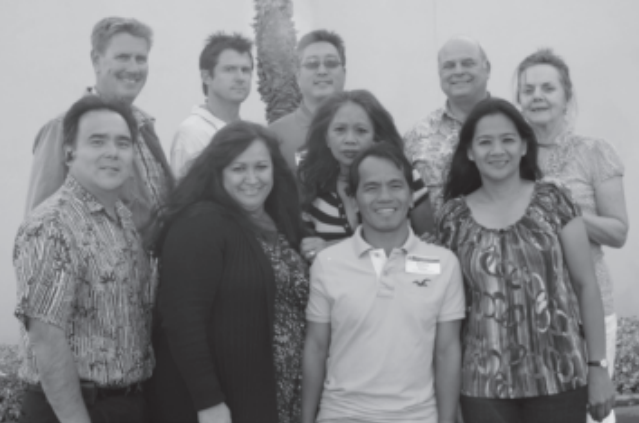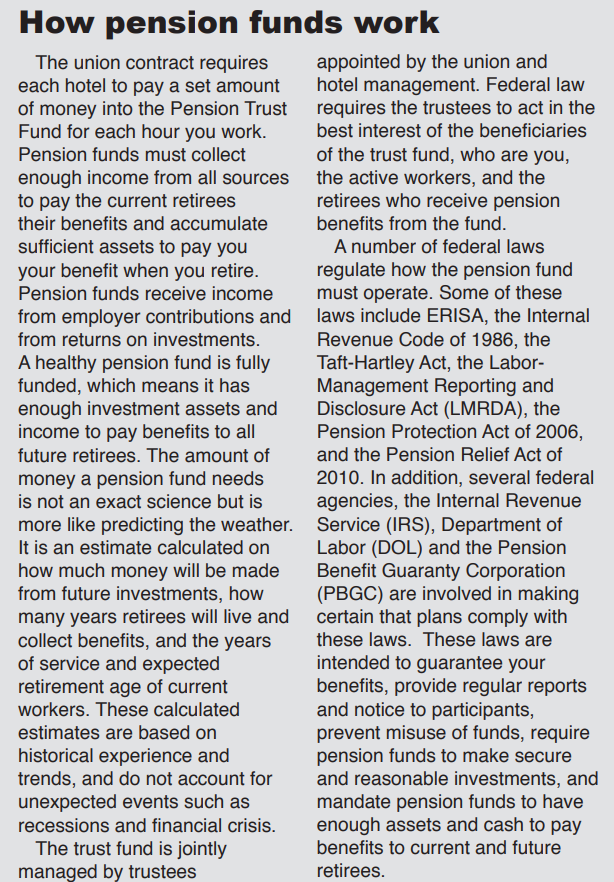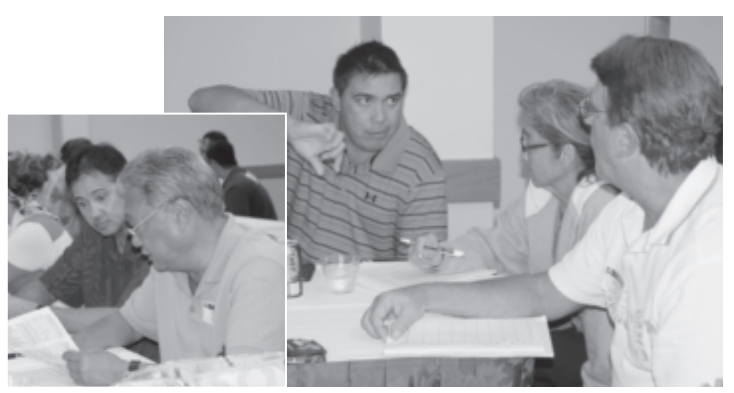
Participants from the Unit 2520 - Grand Wailea Resort discuss their plan and timeline for mobilizing members around contract issues. (L-r, standing) Steve West, Jason Medeiros, Michael Friday, Henry Oandasan, and Valerie Salmon. (Sitting) Helene “Lei” Kaiahua-Sado, Robert Apo, Merlina Valdez, and Perlita Manlansing.
Wailuku, MAUI—Over 130 member-delegates from ILWU hotels and golf courses met at the Maui Beach Hotel on October 19, 2011, to build unity and reach agreement on the most important goals for upcoming contract negotiations with their employers. The one-day caucus is the second statewide meeting of some 40 ILWU units in the tourism industry from all islands. The first caucus of the same tourism industry group was held last year on Maui on September 27 and 28, 2010.
In the coming three years—2012 to 2014—over 7,600 ILWU members in 36 hotels and golf courses will be negotiating new labor contracts. The industry-wide tourism caucuses are intended to prepare the union and its members to negotiate contracts that will raise the standard of living of hotel workers and substantially increase contributions to the pension fund in order to provide an adequate retirement benefit.
Local President Isaac Fiesta, Jr. opened the caucus by stressing three goals for negotiations in the tourism industry—put more money into the pension fund to pay a decent retirement benefit, bring more hotels into the health and welfare trust fund, and start a new fund to provide medical benefits to retirees.
Maui Division Director William Kennison welcomed the delegates to Maui. Kennison told the delegates that tourism has done better than other industries during the recession and is now leading the recovery as the economy improves. The high cost of medical insurance is hurting many companies, but ILWU hotels in the Health and Welfare Trust Fund are saving a lot of money and are paying a composite rate of $620 a month for family or single medical coverage in 2011. Kennison revealed that some companies pay over $1,200 a month for family coverage and $800 a month for single coverage. The employees of these companies are also hurt when they are forced to pay part of the higher cost of medical coverage. These companies and employees would benefit by negotiating with the ILWU to join the Hotel Health and Welfare Trust Fund or the separate General Trades Health and Welfare Trust Fund.
Wesley Furtado, ILWU International Vice-President Hawaii, stood in for ILWU International President Robert McEllrath, who was unable to attend the caucus. McEllrath was tied up with the struggle to retain longshore jurisdiction at the EGT grain facility in Longview, Washington. Furtado explained how the West Coast longshore membership learned it was vitally important to take care of both pension and wages. Four negotiations ago in 1996, longshore negotiations focused on increasing wages and less on pensions, but members who retired found their retirement benefits were too low. In the 1999 and 2002 negotiations, the longshore division made increasing pension a high priority and in some years agreed to smaller wage increases in order to put more money into their pension fund.
Guy Fujimura, Local 142 SecretaryTreasurer, told the delegates how ILWU hotels used to have the same wages, benefits, and standard language under a master contract with the Council of Hawaii Hotels. Money and benefits were the same no matter where you stood in the hotel industry or which island your hotel was located. There was an industrywide Adjustment Board to interpret the contract. In 1995, the Council of Hawaii Hotels broke up and hotels began negotiating separate agreements with the ILWU. Wages, benefits, and contract language began to move away from a state-wide industry standard to island-based standards.
Fujimura thanked the delegates for their support and the support of the membership when they voted to increase Local union dues by 0.5 percent in the 2009 ILWU Convention. The increase was needed to recover from the economic recession and the loss of income due to the closure of a number of companies. Fujimura reported that the union’s finances are now on a sound footing and sufficient money has been set aside to rebuild the union’s emergency reserve fund. The union had sufficient income to hold the two Tourism meetings and one General Trades Caucus even though these expenses were not included in the budget adopted by the Local Convention in 2009.
Increase in contributions needed for pension fund
Charlie Furuike, the ILWU’s pension plan consultant, gave the first major presentation of the day. He explained why the union must negotiate a substantial increase in contributions to the hotel pension fund.
The hotel pension fund did well from 1986 to 2001. A housekeeper with 25 years of service who retired at age 66 would receive an income from pension benefits and Social Security which would replace over 80 percent of their income while they were working. A housekeeper with 30 years of service would receive a combined income from pension and Social Security which was closer to 90 percent of their working income.
Stock market crashes
Led by the spectacular growth of internet-technology companies, stock market prices were soaring and breaking historical records. Between 1995 and 2000, the ILWUHotel Pension Fund grew by about 20 percent a year and by 2000 had a market value of $185 million, which was more than enough to cover estimated liabilities (payments to current and future retirees) of about $160 million.
In March 2000, the economy stopped growing and stock prices began to fall.
The investment craze over internet companies had driven the price of their stocks far beyond what these companies were worth. Many of these companies never made a profit, were founded on ideas that would never succeed, or were poorly managed. Within two years, half of the internet startup companies went out of business after spending all of their investment capital.
The impact of these closures rippled throughout the U.S. economy. Thousands of their employees lost their jobs while still in debt for home loans or new cars. Newly constructed office complexes stood vacant and landlords lost rental income. Suppliers and service providers were left with unpaid bills. Investment funds discovered their stocks of many of the internet-technology companies were worthless. Established and stable companies lost money due to their exposure to technology investments. Banks lost money as individuals and companies defaulted on their loans and debts became uncollectible.
The U.S. stock market would lose $5 trillion in market value from March 2000 until October 2002.
Pension plan underfunded
Pension funds are prohibited from making risky investments, but every pension fund in the United States lost money during the recession and stock market crash of 2000 to 2002. Furuike estimated the ILWU Hotel pension fund lost about 22 percent or $40 million in the market value of its assets over this three year period.
By 2003, the ILWU Hotel pension fund was significantly underfunded. The fund was worth about $145 million but to be fully funded, the plan needed assets of at least $175 million to pay projected benefits owed to retirees. The Trustees made changes to the plan’s benefits that were necessary to keep the plan funded in accordance with the Employee Retirement Income Security Act (ERISA) and the stock market began a slow recovery after 2004 and the pension fund’s market value increased for the next four years, but then another economic crisis hit.

Unit 2516 - The Hyatt Regency Maui will be the first major hotel opening negotiations in 2012. It is crucial that Hyatt bargaining goes well, because the contract at the Hyatt may set the standard for following negotiations. The unit is already several months into an intensive education and mobilization effort led by unit leaders, pictured above. (L-r, back row) Ronald Johnson, Timothy Lessnau, Steven Lee, Business Agent Abel Kahoohanohano, and Pamela Dyson from the Hyatt Maui Spa. (Front) Unit Chair Cyrus Kodani, Charlene Kahoe, Esther Balala, Danilo Baldos, and Rose Abut.
The financial crisis of 2008- 2009 was the worst since the Great Depression of the 1930s. The hotel pension fund lost over $60 million of its market value in a single year. In 2009, the pension fund lost everything it had gained since 2003 and was back to a market value of $145 million. The fund’s liability, or money owed to current and future retirees, continued to grow and was now over $216 million.
This level of underfunding put the ILWU Hotel Pension Fund in the critical “Red Zone” according to rules set by ERISA. Once a pension plan is certified as “Red,” employers must increase their contribution to the pension plan by 5 percent of their current rate for the remainder of the year. Employers must increase their contribution by 10 percent in the second year until the expiration of the current collective bargaining agreement.
In addition, the trustees of the pension plan must develop and adopt a rehabilitation plan to increase contributions, reduce the level of underfunding, and bring the plan out of the “Red Zone.”
The rehabilitation plan adopted by the ILWU Hotel Pension Plan included the following:
1) Effective January 1, 2010—plan participants will earn a pension benefit equal to one percent of their total employer contributions for that year and for following years.
2) Effective January 1, 2011—three changes were made:
a) Disability retirements were eliminated.
b) Pre-retirement death benefits would only be paid after a participant is age 55 or older.
c) Early retirement benefits were reduced according to a new formula for participants who reach age 55 after December 31, 2010. However, benefits earned before December 31, 2010 are protected and remain at the higher rate
Out of the Red Zone
The ILWU Hotel Pension Fund also took advantage of the Pension Relief Act of 2010 signed by President Obama which eased funding requirements and gave pension plans a longer period of time to recover investment losses during 2008 and 2009. These changes have allowed the ILWU Hotel Pension Fund to get out of the critical “Red Zone.”


(Left) Oahu Business Agent Karl Lindo reviews caucus material with Unit 4524 - Ohana Airport Hotel Unit Chair Owen Castagan. Ohana Airport Hotel is one of two ILWU-organized hotels on Oahu; the other is the Pacific Beach Hotel, whose workers are still fighting for their first contract. Lindo is also the Business Agent for Pacific Beach Hotel workers. (Right) Unit 2523 - Ritz Carlton Kapalua members Kanaiela Palazzotto, Amy Kawaguchi, and Michael Spath discuss a schedule of mobilizing activities for their unit. The Ritz Carlton contract expires in 2013.
Pension increase needed
The ILWU Hotel Pension Plan is recovering from the losses suffered in two major recessions in the last 10 years. However, because of the changes that the Trustees have had to make to the plan benefits since 2000 in order to keep the plan funded in accordance with ERISA, pension benefits for the years after 2001 are much too low to provide an adequate income for younger workers who will retire in 10, 20, or more years from now.
ILWU hotel members must support a substantial increase in pension contributions when they negotiate new union contracts with their employers.
Furuike indicated that, based on the plan’s current benefit formula, a contribution rate of $1.50 to $1.85 an hour would provide a decent retirement benefit (i.e, a combined retirement benefit of 80% of working income).
Health and Welfare
Paul Tom, the union’s medical consultant from Benefit Plan Solutions, Inc., explained how the ILWU Health and Welfare Trust Fund has benefited members. He covered how it would be possible to create a separate fund to provide medical benefits to retirees.
Approximately 3,700 out of 8,000 ILWU tourism members and covered under the ILWU Health and Welfare Trust Fund.
The Health and Welfare Fund started in 2005 with three hotels—the Hyatt Regency Maui, the Grand Hyatt Kauai, and the Hilton Waikoloa Village. In 2007, the Four Seasons Resorts Lanai (The Lodge at Koele and Manele Bay Hotel), Castle and Cooke Resorts Lanai, and the Kaanapali Beach Hotel on Maui joined the Fund. In 2010, the Mauna Kea Beach Hotel on the Big Island came under the Health and Welfare Fund. In 2011, The Westin Maui Resorts and Spa and Princeville Operating Company (Kauai) came under the Health and Welfare Fund.

